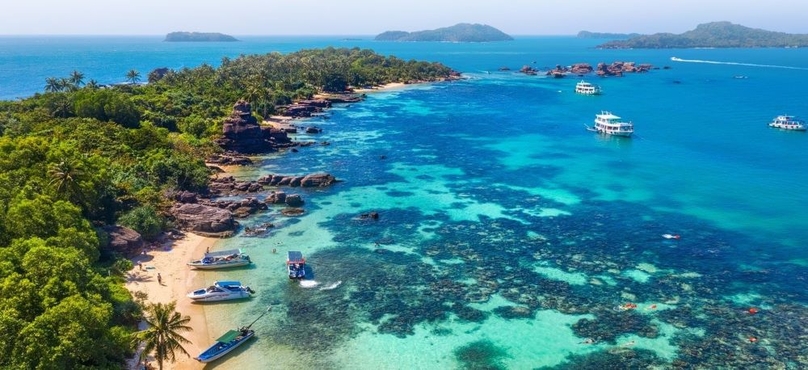Sustaining and navigating the dynamics of high-end tourism: Vietnam's appeal and strategies for enhancement
Vietnam's unique blend of ancient traditions and modern amenities has created a distinctive appeal for luxury travelers seeking immersive experiences, write Jackie Ong, RMIT Vietnam’s senior program manager for tourism and hospitality management, and Trang Pham, a lecturer at the university.

Phu Quoc, Vietnam's largest island and one of the country's top travel attractions. Photo courtesy of VinWonders.
High-end tourism is synonymous with luxury 5-star travel, representing a segment of the travel industry characterized by exclusive experiences, premium services and accommodation, and a focus on personalized and high-quality amenities with tailor-made itineraries.
Luxury travelers are characterized by their willingness to spend significantly on unique and personalized travel experiences that cater to their discerning tastes and preferences. A desire for authenticity, cultural immersion, and a high level of comfort and service drives this segment. Despite economic challenges, this niche attracts wealthy visitors seeking unique and enriching travel experiences.
The allure of Vietnam for high-end tourism
In recent years, Vietnam has emerged as a thriving tourist destination, capturing the attention of a wide range of travelers seeking new and interesting experiences. Vietnam's rise as a luxury travel destination can be attributed to its rich cultural heritage, UNESCO world heritage sites, breathtaking and diverse pristine landscapes, authentic cuisine, and a growing number of high-end hospitality establishments. The country's unique blend of ancient traditions and modern amenities has created a distinctive appeal for luxury travelers seeking immersive experiences. Vietnam’s authentic soft assets reflected through its welcoming hospitality capture the hearts of high-end travelers.
Today, luxurious hotel properties, equipped with world-class amenities, are mushrooming in Vietnam's tourism landscape. The increasing number of high-end luxury hotels such as JW Marriot, Six Senses, Ritz-Carlton, Oriental, Four Seasons, Intercontinental Hotels and Resorts, Sofitel and Banyan Tree are catering to the discerning tastes of luxury tourists, providing them with exclusive services, personalized attention, and an immersion into the country's diverse cultural offerings.
Furthermore, Vietnam's strategic geographical location in Southeast Asia makes it an attractive destination for high-end travelers looking to explore the region. Its proximity to other popular tourist destinations adds to the allure, allowing visitors to create multi-destination itineraries that include Vietnam. As well as short get-aways from the busy lifestyle.

Dr. Trang Pham, RMIT lecturer of tourism and hospitality management. Photo courtesy of RMIT.
Challenges in Vietnam's high-end tourism industry
Despite the growing popularity of high-end tourism in Vietnam, the industry faces challenges that need strategic attention. One notable challenge is the shortage of middle managers with degrees in tourism and hospitality.
According to statistics from the Vietnam National Administration of Tourism (VNAT), the demand for accommodation workers alone will be more than 800,000 people in 2025 and more than one million in 2030. On average, this field needs to add more than 60,000 workers each year.
However, vocational schools and tourism colleges can only provide around 15,000 workers for the sector annually, and the current manpower training has not met the demand.
The labour shortage will impact the seamless operation of high-end establishments, affecting the quality of services provided to luxury travelers. The demand for qualified professionals in the industry has outpaced the supply, creating a gap that needs urgent attention.
Labour shortage and the role of education
To address the shortage of middle managers, educational institutions such as RMIT’s degree in tourism and hospitality management plays a crucial role. The bachelor degree serves as a bridge, providing the necessary skills and knowledge to meet the industry's demand for qualified professionals. These recently graduated managers are the future senior managers and C-suite leaders of this sector.
Educational programs that focus on practical training, industry exposure, and the development of soft skills are essential for preparing graduates to excel in high-end tourism. Collaborations between educational institutions and luxury hospitality establishments can create internship opportunities, allowing students to gain real-world experience and establish connections within the industry.

Jackie Ong, RMIT Vietnam’s senior program manager for tourism and hospitality management. Photo courtesy of RMIT.
Promoting sustainable practices and enhancing cultural experiences
Another challenge that high-end tourism faces globally is the increasing emphasis on sustainable and responsible travel. Luxury travelers are more conscious of their environmental impact and seek destinations and establishments that align with their values. Vietnam, in order to sustain its appeal to the luxury segment, must adopt and promote sustainable practices across its tourism industry.
This involves integrating eco-friendly initiatives, supporting local communities, and minimizing the ecological footprint of high-end tourism activities. Luxury hotels and resorts can lead the way by implementing green technologies, sourcing locally-produced goods, and engaging in community development projects. Such initiatives not only contribute to environmental conservation but also enhance the overall appeal of Vietnam as a responsible and ethical luxury travel destination.
Vietnam should continue to emphasize its unique cultural experiences to further captivate luxury travelers. High-end tourists are often seeking authenticity and immersion in local traditions. Collaborations with local artisans, cultural events, and curated experiences that showcase the country's heritage can set Vietnam apart as a destination that offers more than just luxurious accommodations.
Tailoring luxury culinary, wellness, and shopping expeditions showcase local authenticity, and further developing destinations like Ha Long Bay into premium cruise experiences also taps into luxury travelers’ interests. Combining top-tier amenities and rare cultural encounters into curated high-end tour packages, Vietnam can boost its appeal as an exclusive, exciting travel experience warranting luxury guests’ strong investment and interest. The allure remains; Vietnam needs to calibrate its offerings better to captivate those seeking the finest tourism has to offer.
Investing in infrastructure and tourism facilities
Infrastructure development plays a crucial role in sustaining and enhancing high-end tourism. Improvements in transportation, including airports, seaports and jetties, water and road networks, can make it easier for luxury travelers to explore different regions of Vietnam. Additionally, investing in state-of-the-art facilities, such as conference centers and entertainment venues, can attract large-scale MNC events, further boosting the country's ability to attract this high-spend segment.
The lucrativeness of high-end tourism development inspires numerous countries to follow models like Dubai in attracting wealthy visitors. Places worldwide are now developing exclusive mega-resorts and hotels catering to free-spending elites over mass tourism. Cambodia rebranded itself from “less-developed” to luxury by building posh resorts along untouched coasts and islands. China enabled famous chains like Sheraton to build opulent Hainan properties beside five-star beach hotels rapidly. This “high yield, low volume” tactic focuses on lavishness over volume.
Product development and destination branding
Effective marketing strategies are essential for promoting Vietnam as a top-tier luxury travel destination. Collaborations with international luxury travel agencies, participation in prestigious travel shows, and targeted digital marketing campaigns can elevate the country's profile among high-net-worth individuals. Creating a strong and consistent brand image that highlights Vietnam's unique offerings will contribute to its sustained success in attracting luxury travelers.
As Vietnam emerges as a luxury destination, understanding and catering to high-end visitors' preferences based on nationality and age is critical to future growth. Westerners seek elite lodging and rare adventures. Gulf nation holidaymakers prioritize lavish shopping near 5-star hotels. Chinese tourists prefer hip, personalized urban encounters, favouring boutique stays over large resorts.
Generational differences matter too – Gen Z prefers artsy cities, while older groups go for beach resorts. To attract aging Western travelers, coastal havens like Nha Trang must emphasize glitzy hotels, seaside activities, and premium dining. Creative hubs like Hanoi and Ho Chi Minh City should provide specialized cultural outings and posh short-term apartments to lure Chinese Gen Zers.
In conclusion, Vietnam's ascent as a high-end tourism destination is undeniable, driven by its cultural richness, scenic beauty, and a growing number of luxury accommodations. However, challenges such as the shortage of skilled labour and the increasing importance of sustainability must be addressed to ensure the continued growth of this sector.
Through education, sustainable practices, cultural enrichment, infrastructure development, and strategic marketing, Vietnam can overcome these challenges and enhance its appeal to the discerning luxury traveler, solidifying its position as a premier destination for high-end tourism.
- Read More
Amid the rise of e-commerce, physical retail remains resilient
Shifting the focus from purchasing to experience-led environments that are engaging creates compelling reasons for visitors to stay longer, return more often, and ultimately drive footfall beyond products alone, write Savills Vietnam analysts.
Consulting - Tue, December 30, 2025 | 3:14 pm GMT+7
Vietnam competition watchdog summons VNG over Zalo user data terms
The Vietnam Competition Commission (VCC) has summoned tech unicorn VNG (UPCoM: VNZ) after its messaging app Zalo abruptly updated its terms of service, requiring users to agree or face account deletion.
Companies - Tue, December 30, 2025 | 2:36 pm GMT+7
Taseco Land rides investment wave, expands industrial property footprint in northern Vietnam
Amid the continued rise of FDI inflows into Vietnam and the ongoing shift of global supply chains, Taseco Land is gradually affirming its role as a long-term, strategically oriented industrial park developer.
Companies - Tue, December 30, 2025 | 1:39 pm GMT+7
Vietnam’s pharma export hits $312 mln in 2025, ranking 4th in Southeast Asia
Vietnam’s pharmaceutical market is maintaining steady annual growth of 6-8%, with total market value projected to rise from about $2.7 billion in 2015 to around $8 billion by 2026, making the country one of Asia’s fastest-growing drug markets, the Drug Administration of Vietnam reported.
Economy - Tue, December 30, 2025 | 1:13 pm GMT+7
FPT Telecom sets sights on top spot in Vietnam’s internet TV market
By securing exclusive rights to broadcast the English Premier League (EPL), FPT Telecom has underscored its ambition to become Vietnam’s leading internet television and digital services provider.
Companies - Tue, December 30, 2025 | 11:53 am GMT+7
Vietnam's credit growth to hit 19% in 2025, highest in many years: central bank
Vietnam’s credit growth has reached one of its highest levels in years, pushing the country’s credit-to-GDP ratio to the highest among lower-middle-income economies, according to the central bank.
Economy - Tue, December 30, 2025 | 8:51 am GMT+7
Novaland shares hit ceiling price after HCMC project resumption
NVL shares of Novaland, one of the major real estate developers in Vietnam, hit its ceiling price of VND14,150 ($0.54) on Monday, following news that its The Park Avenue project in Ho Chi Minh City resumed construction after eight years of delay.
Real Estate - Mon, December 29, 2025 | 10:16 pm GMT+7
Indonesia promotes waste-to-energy conversion
Facing mounting pressure from the rapid growth of household waste, Indonesia is accelerating initiatives to convert waste into energy (WtE) as a key pillar of its green growth and circular economy strategy.
Southeast Asia - Mon, December 29, 2025 | 8:01 pm GMT+7
Create Capital Vietnam, Haimaker.ai plan $1 bln AI data center network
Create Capital Vietnam (HoSE: CRC) and Haimaker.ai have unveiled plans to develop a nationwide network of AI-focused data centers in Vietnam, with a total designed capacity of 100 megawatts and investment of about $1 billion.
Industries - Mon, December 29, 2025 | 7:37 pm GMT+7
VinSpeed begins survey work for $5.3 bln high-speed railway in northern Vietnam
VinSpeed, a rail company founded by Vingroup chairman Pham Nhat Vuong, has begun survey work in Vietnam’s northern province of Bac Ninh for a proposed $5.3 billion high-speed railway linking Hanoi with the northern port province of Quang Ninh, local authorities said.
Infrastructure - Mon, December 29, 2025 | 4:42 pm GMT+7
Sacombank stake sale could be accelerated: broker
Broker Vietcap says the appointment of Nguyen Duc Thuy as acting CEO of Sacombank could signal more positive progress toward the long-delayed sale of a 32.5% stake in the lender currently held by the Vietnam Asset Management Company (VAMC).
Finance - Mon, December 29, 2025 | 4:15 pm GMT+7
Northern Vietnam province Hung Yen eyes building int’l airport after 2030
Hung Yen province, home to the $1.5 billion Trump International Hung Yen project, has proposed developing an international airport as part of its priority investment list for the 2026-2030 period, with a vision to 2050.
Infrastructure - Mon, December 29, 2025 | 4:01 pm GMT+7
Capital-raising race redraws Vietnam’s brokerage landscape
Vietnam’s securities firms are stepping up a race to raise capital to seize opportunities from the market’s upcoming status upgrade, with brokerages backed by parent banks gaining a clear edge.
Finance - Mon, December 29, 2025 | 3:44 pm GMT+7
Property 'heat' seen in central HCMC, outlying areas with good infrastructure
The heat in Ho Chi Minh City’s property market continues to be concentrated in the city center and selected outlying areas with well-developed infrastructure or projects backed by major developers like the Can Gio area.
Real Estate - Mon, December 29, 2025 | 2:18 pm GMT+7
HCMC real estate gains appeal as International Financial Center to take shape
With the establishment of an International Financial Center, Ho Chi Minh City will form an elite community of entrepreneurs and professionals from around the globe. This is very attractive for real estate investors, says architect Truong Van Quang, deputy secretary general of the Vietnam Urban Planning and Development Association (VUPDA).
Real Estate - Mon, December 29, 2025 | 8:00 am GMT+7
Taseco Group marks 20th anniversary, receives Second Class Labor Medal
Taseco Group in December 20 celebrated its 20th anniversary and received the Second Class Labor Medal – a prestigious award from the Party and State recognizing the company's outstanding contributions to socio-economic development.
Companies - Sun, December 28, 2025 | 12:55 pm GMT+7
- 2025 in review & 2026 forecasts
-
Vietnam’s pharma export hits $312 mln in 2025, ranking 4th in Southeast Asia
-
Vietnam's credit growth to hit 19% in 2025, highest in many years: central bank
-
High gold prices to drive prices of property, goods in Vietnam: Sunhouse chairman
-
UOB's latest USD/VND projections for 2026 are 26,300 in Q1, 26,100 in Q2
-
Vietnam among world’s top 15 countries by im-export value: ministry
-
Vietnam M&A 2025: Opportunities reshaped by disciplined capital
























